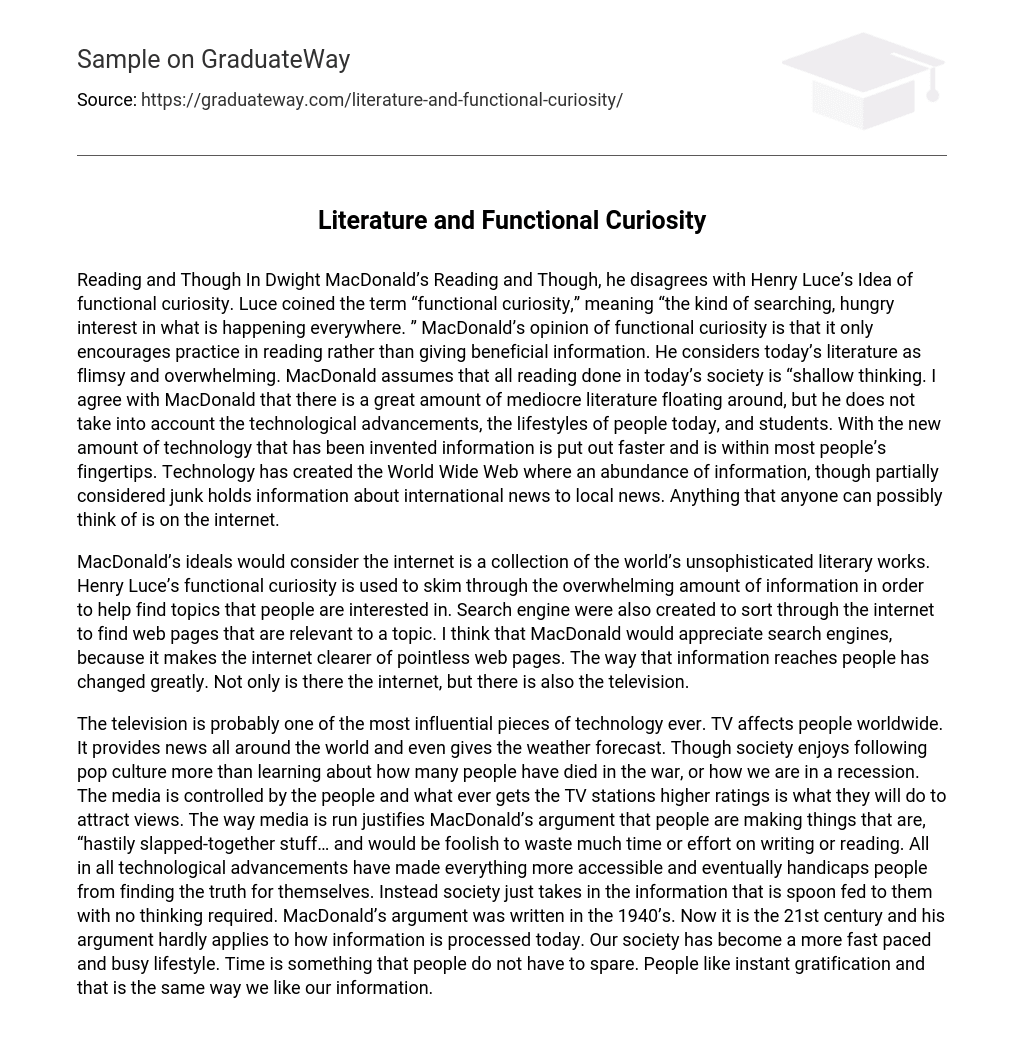In Dwight MacDonald’s “Reading and Thought,” he critiques Henry Luce’s concept of “functional curiosity.” Luce’s term “functional curiosity” refers to an ardent interest in current events. However, MacDonald believes that this type of curiosity only promotes shallow reading habits without providing any valuable knowledge. MacDonald views contemporary literature as insubstantial and overwhelming, categorizing all present-day reading as superficial thinking. Although I agree with MacDonald that there is an abundance of mediocre literature available, he fails to consider the impact of technological advancements, societal lifestyles, and the influence on students. With the rapid development of technology, information is easily accessible and disseminated. The World Wide Web now serves as a platform where vast amounts of information, albeit some might be considered irrelevant, is readily available – from international news to local affairs. Essentially, the internet holds nearly any conceivable topic for exploration.
MacDonald’s view on the internet is that it consists of unrefined literary content from around the world. In contrast, Henry Luce’s inquisitiveness led him to develop methods for quickly sifting through vast amounts of information to identify subjects that capture people’s attention. Search engines were subsequently invented to comb through the internet and locate web pages that are relevant to specific topics. I believe MacDonald would value search engines as they help eliminate irrelevant web pages, making the internet more streamlined. The means of information dissemination has undergone significant changes with the advent of not just the internet, but also television.
The television, a highly influential piece of technology, has a global impact by providing news and weather forecasts. However, society tends to prioritize pop culture over important matters like war casualties and economic downturns. The media, controlled by the people, is driven by ratings, resulting in the production of hastily created content. This aligns with MacDonald’s argument that people are less inclined to invest time and effort into writing or reading. Technological advancements have improved accessibility but have also hindered individuals from seeking the truth independently. Instead, society relies on spoon-fed information without critical thinking. MacDonald’s argument, written in the 1940s, is largely irrelevant in today’s 21st-century society, which values a fast-paced and busy lifestyle. Instant gratification applies not only to goods but also to information consumption.
Literature is crafted to convey maximum information in minimum time. Newspapers are a prime example, structured such that the initial paragraphs provide a summary while the subsequent content delves into details. Whether one delves deeper or moves on depends on their interest in the subject matter. MacDonald’s argument, wherein he imagines a 16th century reader perusing a contemporary newspaper, is flawed. Reading was a privilege mostly accessible to the affluent upper class, and during the 16th century, the majority of people were farmers who lacked literacy skills.
The majority of individuals in the past were unable to read. This was primarily due to their focus on farming or the lack of opportunity to read in the evenings. This starkly contrasts with our modern lifestyle. For instance, professionals working in corporations are required to read extensive amounts of information, even if it is poorly written, in order to identify market trends or stay updated with the latest fashion. Not all reading is without purpose or significance. Literacy plays a crucial role in today’s society, enabling individuals to secure employment and enhance their intellectual growth.
MacDonald argues that all literature is terrible and that reading it only improves reading skills. He fails to consider that students must balance academic reading with personal curiosity. Students live their lives absorbing information, thinking critically, and attempting to understand the meaning of each literary work. Not all reading material is worthless. While there may be numerous advertisements, useless information, and poorly written novels in the world, these things can still serve to relax the mind.
After spending a long time reading a book about oceanography and attempting to comprehend the reasons behind wave movement, taking a break by reading a fashion magazine can be beneficial for mental clarity. Switching from academic literature to a popular novel allows the mind to unwind and absorb information that doesn’t demand much thinking. MacDonald’s viewpoint that certain literary works may lack substance is valid, but they still serve a purpose for students in the long term. Additionally, along with studying, having functional curiosity helps individuals discover their areas of interest. This curiosity can eventually guide them in determining their preferred major or career path.
Using the internet can help you discover your identity and aspirations, ultimately shaping your mindset to achieve your goals. I can personally attest that the internet has been instrumental in guiding me towards future success. MacDonald believes that functional curiosity only leads to being “well informed,” but its impact truly depends on how it is utilized. MacDonald’s argument highlights society’s excessive consumption of meaningless content that fails to stimulate deep thought.
Despite being correct in those aspects, MacDonald’s argument is flawed as he fails to acknowledge the differences in time and individuals across generations. This is particularly evident with students and the corporate world, where claiming that people only read superficial and meaningless works is unfounded. People read not just to expand their knowledge, but also to derive value from what they read. Whether it serves as a stress reliever or a means to discover one’s aspirations, there are instances where reading something of poor quality is necessary to recognize the merits of good literature.





